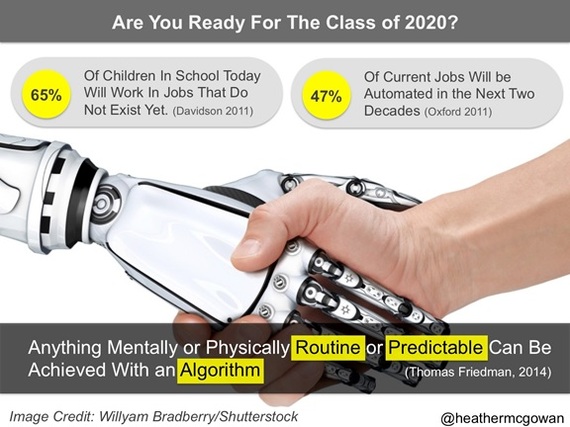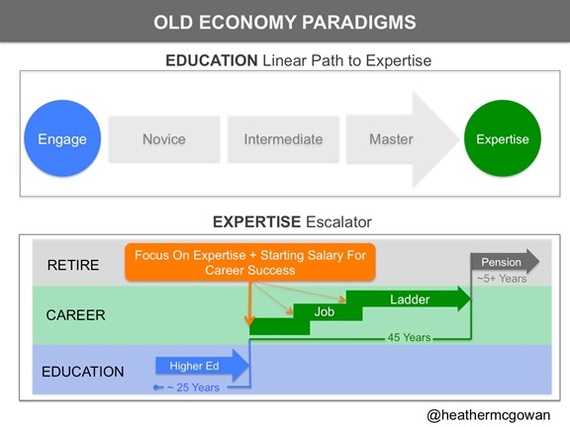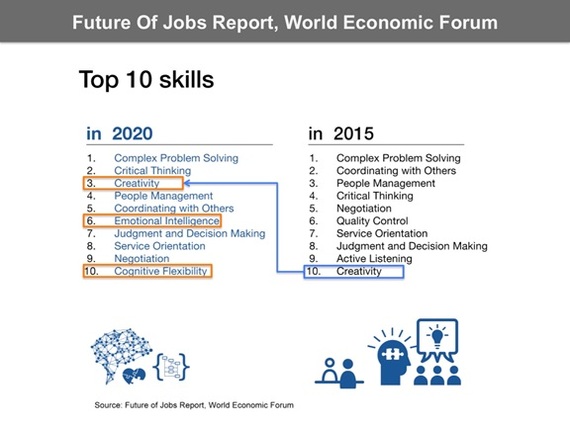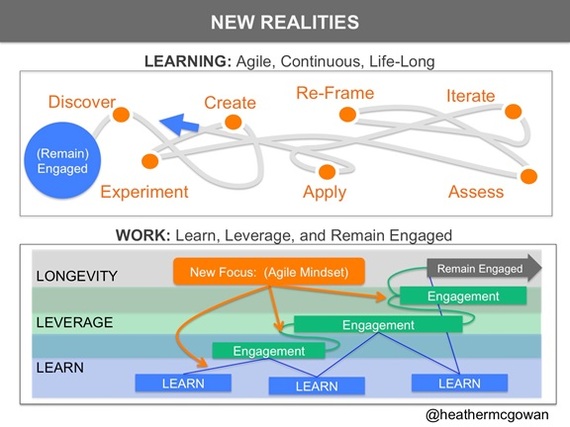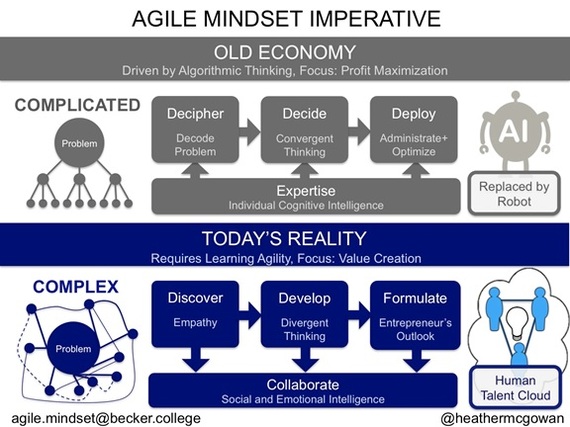Co-authored by Heather E. McGowan, MBA
As the class of 2020 enters university next fall, consider a few notable, recent and projected statistics.
- 65 percent of school age students today will likely work in jobs that do not yet exist (2011)
- 50 percent of the content of an undergraduate degree may obsolete within five years (2020)
- 47 percent of total U.S. employment is at high risk for replacement by computerized automation in the next two decades (2013)
- 48 percent of college graduates are in jobs that do not require a degree (2013)
- 40 percent of the workforce is or will be contingent or freelance (2015, 2020)
- 27 percent of college graduates work in the field of their major (2010)
- 1.3-3.0 -- the number of years Americans ages 20 to 35 stay with any one employer (2014)
- 2,000 -- years of change -- over the next 20 years, we will experience as much change in the way we work as we have in the previous 2,000 years (2015)
Given these trends, why hasn't higher education pivoted away from (or at least broadened) its central focus of preparing students for a first professional job aligned with their major field of study as a definitive measure of the success of their educational program? In this article, we explain why we believe the cultivation of the agile mindset -- an intellectual framework that merges learning agility with a value creation outlook -- in students is an imperative for the future of higher education and our economy.
WHY
In the last industrial revolution, when companies grew through economies of scale, the focus of higher education was to train students to become business leaders and organizational managers who would optimize profit and minimize risk. In this time, expertise reigned, so with few exceptions, a single dose of education to achieve mastery was standard and sufficient for a lifetime career in an industry, if not in a single company.
This old-economy paradigm has long been over. Per a study by Clay Christensen's consulting firm, Innosight, companies once lasted an average of 65 years on the financial ratings service, S&P 500, but that average is 15 years today. At this rate, by 2027 three out of four companies on the S&P will be companies that do not exist today.
Despite this rapid change in business and the professions, colleges and universities continue to develop program goals as the "transfer of pre-defined skills to a new generation of students" destined for discrete careers. As we enter an era of rising automation marked by rapid industry disruption cycles and continuous change enabled by exponential growth in computing power, we need to think differently. "Where we once lived in a world of scalable efficiency," business strategist John Hagel notes, "we now live in a world that requires scalable learning." Recent findings from the World Economic Forum (2015) confirm this shift, charting the anticipated demand for skills as these shift from 2015 to 2020 over to a greater emphasis on creativity and other uniquely human skills like emotional intelligence.
WHAT
Our educational institutions were conceived of at a time when we needed to train farmers to be factory workers or managers. As such, the process, goals, and measures of educating and training students centered on the one-directional transfer of knowledge with the end-goal of developing expertise and reducing risk. But as we begin to reach global connectivity ubiquity, the value of workers with discrete sets of knowledge plummets. Universities must pivot from the goal of educating individuals to store knowledge, to the goal of preparing them to stream information. As one streams information, the value shifts from what you know, to what you can do with what you know, and to how quickly you can learn and adapt, otherwise known as learning agility. Learning agility is the continuous process of discovering, assessing and synthesizing information to form and apply new knowledge to novel and often changing circumstances.
Korn Ferry, the world's largest provider of executive search, identifies learning agility in individuals as encompassing mental agility, people agility, change agility, results agility, and self-awareness. Their research supports learning agility as the greatest predictor of leadership success resulting in executives that are five times as likely to be highly engaged, promoted at twice the rate and leading companies with profit margins 25% higher than their less learning agile peers.
Jobs will not be lifelong. Jobs may not even be jobs at all; they may be engagements. As opposed to the goal of longevity in an industry or at a company, career mobility will be the norm. As such, college graduates today, regardless of how they are employed or engaged, must consider themselves companies-of-one who are responsible for their brand and their business model, and who continuously build their [future] value. At Becker College we call this collective set of skills that merge learning agility and the value creation orientation "the Agile Mindset."
HOW
With the help of seed funding from the Davis Foundation, Becker College has crafted a new core curriculum for all students, regardless of the study major or status (full-time, part-time, online, hybrid, or professional) of the student. This new curriculum creates a foundation in learning agility and value creation with a focus on learning-over-knowing, with specific core competencies: in empathy to find new needs; divergent thinking to find and frame problems not yet known; an entrepreneurial outlook to turn uncovered needs into new value; and social and emotional intelligence to collaborate effectively in trans-disciplinary teams. We are recasting all our programs to place the agile mindset as the institutional ethos, most notably in business and healthcare, where we expect rapid cycles of disruptive innovation to reshape these industries and redefine the workforce needs.
We believe this will instill in our graduates a defining advantage. It will enable them to navigate and succeed in what is being called the next industrial revolution. It will provide them with the skills necessary to shift to a mindset that can imagine and create new forms of value. The work world of the future will require individuals who can make sense and meaning of new and emerging needs, and solve problems not yet known.
We seek collaborating institutions that share our vision, new faculty and staff to join this mission, and funding partners to help realize this new paradigm. This is our call to action. Join us!
Follow Robert E. Johnson on Twitter: www.twitter.com/BeckerPrez
Follow Heather McGowan on Twitter: https://twitter.com/heathermcgowan
Source: Kathy Davidson, Now You See It: How Technology and Brain Science Will Transform Schools and Business for the 21st Century, (2011)
Source, Deloitte University Press (2014) http://dupress.com/articles/reimagining-higher-education/
Source: Oxford Martin Study (2013) The Future of Employment: How Susceptible Are Jobs to Computerization http://www.oxfordmartin.ox.ac.uk/downloads/academic/The_Future_of_Employment.pdf
Source: Bureau of Labor Statistics and Center for College Affordability (2013) http://centerforcollegeaffordability.org/research/studies/underemployment-of-college-graduates/
Sources: Government Accounting Office (2015) http://www.gao.gov/assets/670/669766.pdf and Intuit 2020 Study http://http-download.intuit.com/http.intuit/CMO/intuit/futureofsmallbusiness/intuit_2020_report.pdf
Source: Census Bureau (2010 Data) https://www.washingtonpost.com/news/wonk/wp/2013/05/20/only-27-percent-of-college-grads-have-a-job-related-to-their-major/
Source: Bureau of Labor Statistics (2014) http://www.bls.gov/news.release/pdf/tenure.pdf
Autodesk Chief Technology Officer, Jeff Kowalski, keynote speech at Autodesk University Summit 2015 https://www.youtube.com/watch?v=o3GitltIblc
Creative Distruction Whips Through Corporate America, http://www.innosight.com/innovation-resources/strategy-innovation/creative-destruction-whips-through-corporate-america.cfm
John Hagel, Deloitte Center For The Edge
Source: Korn Ferry 2014 Report https://www.kornferry.com/products/talent-development/developing-learning-agility

